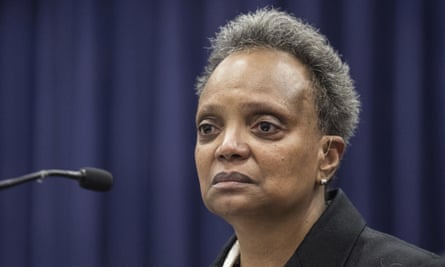The race could serve as a litmus test for police reform – and Brandon Johnson’s policies on crime could leave him vulnerable in the general election
Brandon Johnson was in his element at Kenwood Academy high school.
The bespectacled former social studies teacher and candidate for Chicago mayor sat at a table next to his opponent, former Chicago public schools CEO Paul Vallas, during a recent afternoon debate. In an exhausting series of mayoral debates, Johnson had a home field advantage at Kenwood, where his son attends school.
Johnson is a member of the Chicago Teachers Union (CTU) and its former deputy political director. The CTU has thrown its support behind Johnson while Chicago’s cop union, the Fraternal Order of Police, has endorsed the tough-on-crime Vallas. The moderators at Kenwood opened with a question about whether the mayoral race was a proxy war between the Fraternal Order of Police and CTU.
Johnson, who now serves as a Cook county commissioner, has joked in the past that he didn’t become a pastor like his father or sister because they weren’t unionized. But it’s clear that his family’s work in the church has shaped his commanding presence in secular spaces – as it did that day.
“This is about Black labor versus white wealth. That’s what this battle is about,” Johnson responded. “This is about providing community access to the very public accommodations which Black people fought for, especially after emancipation. It’s what the descendants of slaves in this room are fighting for: public education, public transportation, affordable housing, healthcare and access to jobs.”
The Chicago mayoral election is one of the most heated city battles in the country and could serve as a litmus test for police reform policies at a time when the topic of crime and public safety is central to both voters and politicians. Recent mayoral races in the liberal strongholds of New York City and Los Angeles have produced mixed results. In New York, ex-cop Eric Adams claimed victory with a centrist message while the reform-minded former congresswoman Karen Bass won the Los Angeles mayoral race on a progressive platform, though some Black Lives Matter activists criticized her recent decision to reappoint a controversial chief of police.
In 2019, Chicagoans had elected Lori Lightfoot based on her message of transparency and reform. Instead, her tenure was marred by a botched police raid as well as drawn-out battles with both the CTU and the FOP.

Turnout for the February primary was sluggish, with less than 33% of Chicago voters casting a ballot. Much of the recent mayoral primary map in February broke down along racial barriers: in the primaries García took Hispanic voters on the West Side, Black voters on the South and West sides remained loyal to the sitting mayor, Lori Lightfoot, while Vallas won over white voters in north-west Chicago. Johnson, meanwhile, commanded white progressives on the North Side.
But Johnson’s progressive policies on dealing with crime, which fired up his base in the primary, could leave him vulnerable in the general election. Vallas has seized upon Johnson’s past support of the defund the police movement and Democrats across the country are closely watching to see if that could prove Johnson’s undoing.
A finely tuned machine
Johnson likes to boast that he started his campaign polling at just 2.3%. But he carries himself like a veteran politician, not an underdog. Johnson is charming, if guarded, and his affable middle school teacher demeanor turns pugnacious in debates and in spin rooms with reporters.
With the help of progressive campaign operatives with Bernie Sanders on their résumés, Johnson is now a finely tuned machine picking up support from both leftist and moderate Democrats. He has been anointed by kingmakers like the South Carolina congressman Jim Clyburn, who memorably turned around the prospects of Joe Biden during the 2020 Democratic presidential primary, and Congressman Danny Davis, the Illinois representative whose protege and former chief of staff lost his county commissioner seat to Johnson in 2018.
He also nabbed the endorsement of the renowned political activist the Rev Jesse Jackson, who delivered a speech with Johnson from his Rainbow Push Coalition headquarters in Chicago’s Hyde Park neighborhood earlier this month. It’s clear that Johnson would like to model himself after Jackson. He’s taken pains to characterize his campaign as a continuation of the civil rights movement, repeatedly noting that the 4 April runoff election marks the date of Martin Luther King Jr’s assassination.
When asked by the Guardian which historical or political figure Johnson might liken himself to behind the scenes at the event, Jackson threw up his arms gesturing at himself.
“I’m just saying,” Johnson said with a laugh, looking at Jackson. “There is no President Barack Obama without Reverend Jesse Jackson. He changed the rules of the game. There’s a lot of history of progressive ideology and liberation from the city of Chicago.”
Johnson also regularly hosted a radio show in Chicago helmed by Santita Jackson, the reverend’s daughter. It’s on that show that one can find a more honest expression of Johnson’s progressive views than on the campaign trail. It was where he made remarks about the defund police movement as an “actual, real political goal”.
Johnson has since walked back that statement, saying: “It was a political goal. I never said it was mine.” He recently reversed plans to reduce the city’s nearly $2bn police budget, telling an audience of Chicago business leaders he wouldn’t “reduce the CPD budget by one penny”.
‘Turning stress into action’
Several prominent figures, including Jackson and late Chicago Teachers Union president Karen Lewis have used the phrase “educational apartheid” to describe the dearth of resources and school closures in Chicago’s Black and brown neighborhoods. Johnson also shared those beliefs with his mentor and colleague, Tara Stamps, who shaped his early career as an educator.
Stamps said she met Johnson in 2007 when she interviewed him for his first job in education as a middle school social studies teacher at Jenner elementary, a school serving mostly Black students from the embattled Cabrini-Green housing projects. She described the then 31-year-old Johnson as chubbier with long dreadlocks, a warm personality and a great smile.
The apartheid message was not lost on Johnson’s students either, who connected their experiences in CPS with the history of Soweto, Johnson said in a July episode of the Santita Jackson Show. After reading an excerpt from Nelson Mandela’s autobiography, Long Walk to Freedom, they wrote a play called Black to the Future and collaborated with their art teacher to transform their classroom’s doorway into Mandela’s prison.
Johnson and Stamps felt that charter schools were exacerbating segregation. Now, that philosophy underpins his campaign against Vallas, whom he has attacked for promoting charter schools.
“These are ideas that Brandon and I shared early,” Stamps said. “We understood the history of Chicago public schools and at the time when we were working together, it did feel like it was an apartheid system because you have a school system that was just separating children based on who was able to receive the best public education, who would not receive the best public education and who then would go to charters.”
A conversation with a civil rights-era organizer led Johnson further. During an October 2012 forum with the socialist organization Solidarity, Johnson spoke about meeting Grady Jordan, a former CPS teacher and founder of the Teacher’s Union Black Caucus who marched in the October 1963 “Freedom Day” protests against segregation in CPS. Over greens and soul food one day at a West Side diner, Jordan called on Johnson to take up his fight.
“Black teachers fought hard, this is a direct retaliation to what we built in the 60s and the 70s,” Johnson recalled Jordan saying. “They’re trying to kill you. What are you going to do about it, son?”
Chicago’s mayor had taken over the public school system in 1995, giving the administration power over school construction and union negotiations. In 2000, Black teachers made up 40% of CPS educators. By 2018, that number declined by nearly half to 21% of teachers, while Black students made up 37% of the student population, Chalkbeat Chicago reported.
